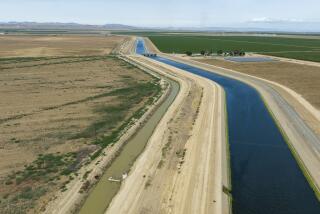Getting Closer to a Water Breakthrough : WATER WATCH: Rain is nothing next to Senate storm
- Share via
Taking advantage of recent heavy rainfall in Northern California, President Bush has ordered delivery of 1 million acre-feet of irrigation water to 7,000 farms that were scheduled to get none at all.
The election-year windfall, or perhaps waterfall, will help a handful of farmers. But the gesture does nothing for the rest of California’s 30 million people who need to cope with drought.
Lasting change will require a basic revision of California water policy, a change that may begin this week when Congress faces a moment of truth for California.
The U.S. Senate Energy and Natural Resources Committee plans to consider on Wednesday fundamental changes in the policies governing operation of the federal government’s biggest water delivery system, California’s Central Valley Project.
SENATE BILL: Chairman Bennett Johnston (D-La.) will ask the committee to move to the Senate floor his version of a bill to free about 8 million acre-feet of irrigation water for use wherever it will yield the greatest benefits for the state as a whole.
Irrigation districts--for so many years the charmed circle of California water policy--are putting up a stubborn battle to preserve the good old days of cheap water for farms.
But the Metropolitan Water District, historically on the side of other water agencies, has parted company with its allies and endorsed the principles of the Johnston bill.
And Johnston, building on a solid legislative foundation spelled out by Sen. Bill Bradley (D-N.J.), has woven a compromise in which there are only winners, no losers. For most Californians, the most immediate benefits would come in urban areas, where 90% of California’s wealth is generated and where many companies wonder how long they can hold out against a drought that, despite recent winter rains, hovers on the edge of a sixth year.
By making it possible for farmers to sell surplus irrigation water, the Johnston and Bradley bills would let cities buy supplies without forcing farmers to live from windfall to windfall in drought years.
Rural California could begin to regain wetlands and wilderness and to remove threats to fish and game in areas that have been drained dry for decades by water projects--too often to irrigate marginal farmland and marginal crops.
Adequate supply in cities will for decades involve buying very small amounts of irrigation water, most of which would come from polluted land that should not be farmed in the first place, or land that yields marginally profitable crops.
Federal law prohibits the sale of water delivered by national projects. The law governing the California project also forbids use of its water outside the San Joaquin Valley.
Johnston and Bradley would, in effect, rewrite federal law to allow California to dictate the disposition of water in the Central Valley project. California law already allows buying and selling of water, like any other commodity, in the separate and smaller California Water Project.
They also would create a sliding scale for prices of federal water. The first 60% of deliveries would be fully subsidized. The next 20% would be partly subsidized. The last 20% would have no subsidy if it were used to irrigate crops whose price were supported by the federal government.
WILSON BID: Last month, Gov. Pete Wilson said he wanted to simply buy the federal water project and operate it as part of the state system. Wilson’s idea is sound, but the timing couldn’t be worse, because it could block enactment of the Johnston bill in the meantime.
Wilson thinks a deal could be wrapped up in six months, but the complex questions involved, not to mention the billions of dollars it would cost, would take years to work out--and California can’t wait that long.
More to Read
Sign up for Essential California
The most important California stories and recommendations in your inbox every morning.
You may occasionally receive promotional content from the Los Angeles Times.













